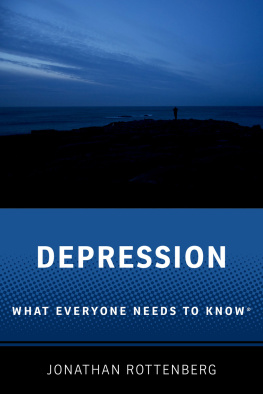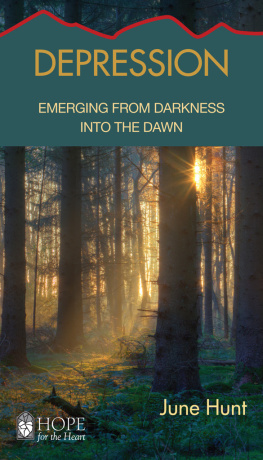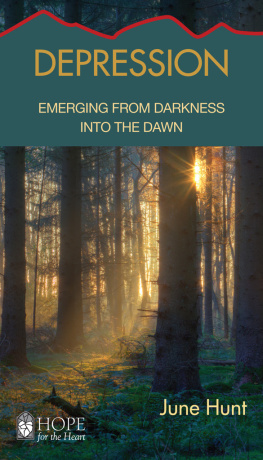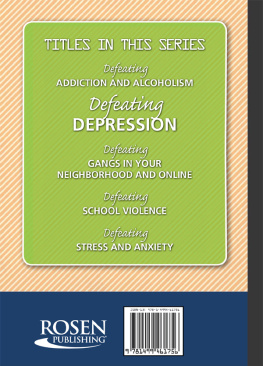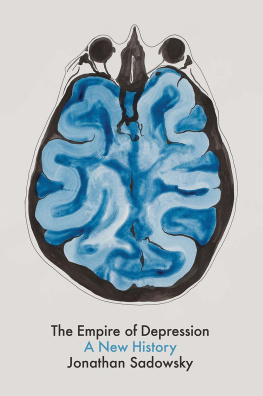THE
DEPTHS


Copyright 2014 by Jonathan Rottenberg
Published by Basic Books,
A Member of the Perseus Books Group
All rights reserved. No part of this book may be reproduced in any manner whatsoever without written permission except in the case of brief quotations embodied in critical articles and reviews. For information, address Basic Books, 250 West 57th Street, 15th Floor, New York, NY 10107-1307.
Books published by Basic Books are available at special discounts for bulk purchases in the United States by corporations, institutions, and other organizations. For more information, please contact the Special Markets Department at the Perseus Books Group, 2300 Chestnut Street, Suite 200, Philadelphia, PA 19103, or call (800) 810-4145, ext. 5000, or e-mail .
Designed by Pauline Brown
Typeset in Stempel Garamond by the Perseus Books Group
Library of Congress Cataloging-in-Publication Data
Rottenberg, Jonathan.
The depths : the evolutionary origins of the depression epidemic / Jonathan Rottenberg.
pages cm
Includes bibliographical references and index.
ISBN 978-0-465-06973-6 (e-book)
1. Depression, Mental. 2. Depression, MentalTreatment. 3. Mood (Psychology) 4. Psychobiology. 5. Evolutionary psychology. I. Title.
RC537.R6585 2014
616.85'27dc23
2013036462
10 9 8 7 6 5 4 3 2 1
For Laura
Contents
I DONT BELIEVE IN OBJECTIVITY, THAT A MAN OR WOMAN CAN dispose of his or her biases and have a gods-eye view of a topic. All we can do is our best to be honest and truthful about our motivations.
For my part, Ive been on both sides of depression. Ive been a depressed subject, wires trailing out of my head, hospital bracelet on my wrist, poked, prodded, questioned about my symptoms. And Ive been the scientific objectifier, the one asking the questions, quantifying the behaviors, noting patterns, tabulating the responses into numbers and graphs and ultimately into the currency of journal articles. The experiences of both sides are very different, but each is valid. Each represents some truth about this dark, sometimes mysterious topic; each sheds light on our depression epidemic, from different angles. In writing this book, my goal has been to draw both sides together into a complementary synthesis, one that attempts to do justice both to the experiences of patients and to the scientific knowledge we have accumulated in the study of mood and mood disorders.
I am grateful for the people who agreed to be interviewed for this book. I have done my best to relate their truth. To protect the identities of interviewees, I have changed names and biographical details throughout.
Jonathan Rottenberg
Tampa, Florida
MORE THAN THIRTY MILLION ADULTS IN THE UNITED STATES SUFFER from depression. At the University of South Florida, where I teach abnormal psychology to undergraduates, I recently asked my class: Who among you have been personally affected by serious depression, either in yourselves, in your family, or in a close friend? Seven in ten hands went up. Its impossible to deny: the depressed are our neighbors, our teachers, our doctors, our friends. The depressed are always among us.
Depressions effects ripple out far beyond the affected individual. For the foreseeable future, depression looms as a preeminent public health menace. In a chilling prediction, the World Health Organization projects that by 2030 the amount of worldwide disability and life lost attributable to depression will be greater than for any other condition, including cancer, stroke, heart disease, accidents, and war (see
FIGURE 1.1. Change in the Rank Order of Disease Burden for Fourteen Leading Causes Worldwide, 20042030.

Adapted from The Global Burden of Disease, 2004 Update, by the World Health Organization, 2008, Geneva: WHO.
This deteriorating situation seems incongruous given the resources we have to combat the noonday demon. There is a growing arsenal of psychological and drug treatments for depression. Social awareness about the symptoms of depression is increasing, and more people are recognizing that it is a bona fide health condition, not a personal weakness or character flaw. Scientific research on depression, from neuroscience to cross-cultural studies, has absolutely exploded.
Yet perversely, as more research and treatment resources have been poured into combating depression, its personal and economic toll has actually grown. Depression now affects more than 15 percent of the population overall, according to our best epidemiological studies,). Once depression starts, it tends to recur throughout life.
Why, despite all the efforts aimed at understanding, treating, and educating the public about this condition, do rates of depression continue to rise? Why have our treatments plateaued in their effectiveness, and why does the stigma associated with this condition remain very much with us?
Why are we losing the fight against depression?
A Broken Model
Matt had been a straight-A student in high school back in New Jersey. He was a jokester, and beloved by his teachers, who said he was very smart. Now in his second semester at the University of Pennsylvania, he planned to study environmental engineering. He wanted to travel around the world to work on projects in developing countries. But Matt couldnt concentrate. And he was dead tired all the time. Maybe Penn had made a mistake in admitting him? As he walked around campus he saw other students looking down at him. Maybe they were righthe was not as smart, not as rich as them; he was just a chump from Jersey. He retreated to his dorm room. Yes, he was tired and lonely, but he would just bull through; he would do what he had to do to get by.
Yet as the months rolled by, the feelings of fatigue grew. His concentration shot, whenever Matt tried to focus on his course work his mind would go blank, or would drift to thinking about his parents, who had split up one year before. Thoughts of bulling through alternated with thoughts of hopelessness and even fleeting thoughts of ending it all. Somehow Matt made it through all his courses, now earning Cs. Although he got through the year without academic catastrophe, Matt knew something, and something serious, was wrong. It started to dawn on him: Maybe Im depressed?
From the perspective of formal diagnosis, there was no doubt about Matts condition. He had multiple symptoms of clinical depression. For months he had lost interest or pleasure in things he used to enjoy, experienced crushing fatigue, shown an inability to concentrate, experienced dramatic changes in his sleeping habits, and even had periodic thoughts of death and suicide. These symptoms cast a pall over his freshman year and interfered with his ability to engage with his studies or appreciate the novelty of college life. Matts symptoms and experiences clearly matched the official category of depression, a major depressive episode, as defined by the American Psychiatric Associations diagnostic manual.
Next page

